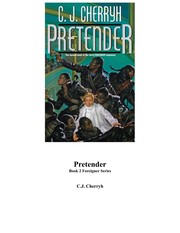CJ Cherryh's Foreigner series is one of my favorites, and I feel like it's wildly underappreciated. I'll keep my future reviews shorter I promise, but let me pitch these thirty year old books to you.
Here's what brings me back to these books:
(1) Interesting alien psychology. The alien Atevi do not have a concept of "love" or "trust". They are instinctually and biologically hierarchical, with upward loyalty in their associations. This creates all sorts of translation friction across cultural boundaries. They are also incredibly numerically-minded, with the numerical equivalent of astrology, finding particular numbers innately more felicitous than others. They do truly act in interesting and non-intuitive ways, and it's so fun to read.
(2) Humans aren't particularly privileged. This isn't an uplift story. Although the humans show up with more technology initially, the Atevi have their own inventions, and have very mixed feelings about how they are being pushed by the injection of another culture's ideas. Both Atevi and human politics are complicated and messy, and the series delves into intricate political worldbuilding about various internal factions on both sides.
(3) A blend of action and politics. There's a lot (a lot) of diplomacy and talking about and (thinking about) politics in these books; but also Atevi also believe that assassination is a respectable and legal means of solving disputes. The combination mean these books read like grippy fantasy political thrillers.
He had no idea what its native customs or expectations must be. It could have very little idea about his. But it was possible to be civilized, all the same, and he found it possible to be gracious with such a creature, odd as it was
(4) The tea drinking. I feel like a through-line of this whole series is about trying to be civilized and gracious even and especially when you don't understand the beings on the other side of the table. It's no surprise to me that the Ancillary books took the tea-drinking detail from this series.
On the flipside, I think CJ Cherryh does not do "alien gender" or "alien bodies" very interestingly here. (One could argue that it's not the point, or the similarity is part of what creates the trap of thinking the characters and the reader can understand them through a human lens.) Maybe I'm picky about this particular detail, but even as I love the alien psychology, it is wild to me to write aliens that are so human-like in other ways. What does stand out to me is that Atevi have two binary genders, which are somehow legible to humans from the first moment they meet. If my memory serves me, these books are also incredibly straight. It just feels like a missed opportunity.
One other thing that makes these books hard to recommend: their length. The series is written as arcs of three novels. Currently, there's seven (7?!) full arcs and one additional novel, for a total of 22 books as I write this. On the positive side, the novels are on the shorter side (no giant fantasy tomes here), and each novel (as well as each trilogy) ends with a great sense of closure. The pacing is quite good (and maybe almost too regular). Personally, I think the first two trilogies cover the most ground and so you could stop there as a reader and still come away with most of the scope.
Ok, let me talk about Foreigner, this first book, specifically.
What I love the most is that Foreigner is a first contact story that is not about the moment of first contact. I've read too many books about the very first moments of meeting aliens; this book brushes past that two hundred years into the future to talk about the politics and power dynamics between stranded humans on an alien world who have a tentative understanding with said aliens. (Incredibly tangentially, but this is the same premise I love about Mira Grant's Feed, a zombie book that zooms twenty years past any initial zombie uprising to talk about the politics of trying to get on living in such a world.)
This first book (and most books) follow the point of view of Bren Cameron, the treaty-established human paidhi. His job is to translate and mediate and be the single point of contact between the Atevi and human governments.
I want to warn a little up front, but the pacing of this first book is a bit wild. Let me try to break it down. There's a few chapters about how humanity ended up on this planet and then time jumps forward. There's some initial action as Bren is attacked in the night. Soon after for his own safety(?), he is carted off to the countryside manor of the Atevi leader Tabini's grandmother, Illisidi. At this point, Bren is out of contact with his government, unsure about who to trust; his security keeps disappearing and won't answer any of his questions; he can't get his mail or a power charger; he gets poisoned (intentionally?); there continue to be attacks (but from whom?); he starts getting paranoid of Atevi that he's previously trusted. I would almost describe this part of the book as worldbuilding through Bren's anxiety, where the things he is worried about help to explain Atevi psychology to the reader. Things get to a breaking point and the book ends with some really good sequences and action, where Bren's will and motives are truly tested multiple times.
What's dangerous about this to me is that for a large portion of the book, Bren (and the reader) have no idea what's going on. There are events and politics happening off page that nobody will tell Bren about no matter how he asks. He is, essentially, a prisoner in Illisidi's country manor. I think this exercise in uncertainty and mistrust is something you could largely only do in a first book in a series, as the reader will know (better) in future books which recurring characters are "on side" or not, as much as you could ever say that with Atevi. This whole section works for me because I think it functions quite well as worldbuilding, but also truly gets into Bren's psychological state as the single human inside the larger Atevi world, trying to cope with his human emotional needs not being met by Atevi who do not understand them and cannot meet them.
At any rate, I love this book. It's such a good introduction to the world and the politics and the characters. This series surely isn't for everybody, but I keep coming back to the interesting aliens, cross-cultural misunderstandings, and intricate fantasy politics.



